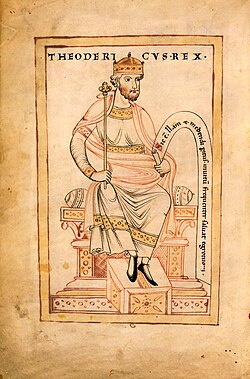Theoderic
Appearance
English
[edit]King Theoderic the Great of the Ostrogoths, the Goth who became the second Germanic King of the Kingdom of Italy, and a map of his united Gothic realms which grew to span a significant portion of the former western (Latin) Roman Empire in the 5th-6th centuries AD.
Alternative forms
[edit]Etymology
[edit]From Late Latin Theodericus, Theodoricus, from a Germanic origin, likely via Gothic *𐌸𐌹𐌿𐌳𐌰𐍂𐌴𐌹𐌺𐍃 (*þiudareiks) from Proto-Germanic *Þeudarīks, from *þeudō (“people”) + *rīks (“king”); thus cognate with German Dietrich.
Etymologically unrelated to English Theodore from Koine Greek Θεόδωρος (Theódōros, “Theodore”, literally “gift of God”), although medieval conflation of the Germanic and Hellenic names may have given rise to variant spelling Theodoric. (Can this(+) etymology be sourced?)
Pronunciation
[edit]Proper noun
[edit]Theoderic
- A male given name from Gothic, equivalent to Koine Greek Θευδέριχος (Theudérikhos) or English Derek; variant form Theodoric.
- A male given name of historical usage, notably borne by Flāvius Theodericus Magnus (Theoderic the Great) (c. 454–526 C.E.), King of the Ostrogoths (from 475), of the Ostrogothic Kingdom of Italy (from 493), and of the Visigoths (from 511).
- A male given name of historical usage, notably borne by Theoderic I (c. 390–451 C.E.), King of the Visigothic Kingdom from 418 to 451.
- A male given name of historical usage, notably borne by Theoderic II (c. 426–466 C.E.), King of the Visigothic Kingdom from 453 to 466.
Translations
[edit]male given name
|
Categories:
- English terms derived from Proto-Indo-European
- English terms derived from the Proto-Indo-European root *h₃reǵ-
- English terms borrowed from Late Latin
- English terms derived from Late Latin
- English terms derived from Germanic languages
- English terms derived from Gothic
- English terms derived from Proto-Germanic
- English doublets
- English 4-syllable words
- English terms with IPA pronunciation
- English lemmas
- English proper nouns
- English uncountable nouns
- English given names
- English male given names
- English male given names from Gothic



